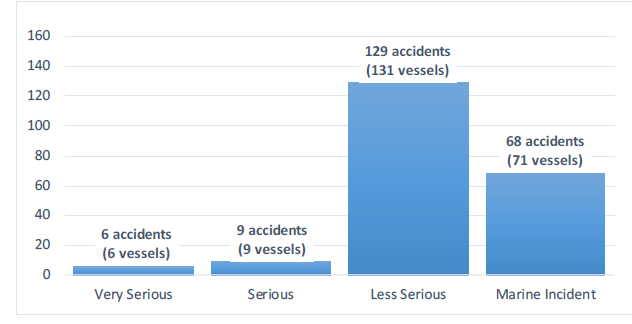In its latest annual report, UK MAIB includes an overview of accidents reported, a summary of investigations started, details of investigation reports published and marine accident statistics. Regarding fishing vessels, UK MAIB reported that the loss rate of fishing vessels is the lowest ever recorded, at 0.11% of the fleet.
Namely, six commercial fishing vessels were lost in 2017 compared with 13 in 2016, with the number of injuries to fishing vessel crew reported an all time low at 32. In addition, five fishermen lost their lives in 2017 compared with nine lives lost in 2016.
[smlsubform prepend=”GET THE SAFETY4SEA IN YOUR INBOX!” showname=false emailtxt=”” emailholder=”Enter your email address” showsubmit=true submittxt=”Submit” jsthanks=false thankyou=”Thank you for subscribing to our mailing list”]
As UK MAIB says these data show that the safety record of commercially operated fishing vessels is improving. However, there are concerns saying that many of the injuries that fishing vessel crew suffer go unreported.
To verify this, the MAIB examined personal injury data supplied by the Scottish Boatowners Mutual Insurance Association. The data contained 113 injuries and fatalities, 98 of which were reportable to the MAIB.

The MAIB’s data for the same period has details of all the fatalities but only 13.5% of the reportable injuries to fishing vessel crew recorded by Scottish Boatowners. This confirms that many accidents that result in injury to are not reported to the authorities.
As Steve Clinch, Chief Inspector of Marine Accidents, notes:
My own discussions with members of the fishermen’s associations, the Royal National Lifeboat Institution (RNLI), the Fishing Industry Safety Group (FISG) and the MCA, plus the evidence provided by 176 accidents involving fishing vessels that have been investigated by the MAIB since I joined the Branch in 2004 suggest that the safety record of the UK registered fishing fleet is improving, but very slowly.
Furthermore, UK MAIB refers to the Work in Fishing Convention 2007 (ILO 188), which provides all fishermen with written terms and conditions of employment, decent accommodation and food, medical care, regulated working time, repatriation, social protection and health and safety on board. It also provides minimum standards relating to medical fitness. ILO 188 standards apply to all fishermen working on commercial fishing vessels of any size. They also apply to employed fishermen and non-employed fishermen.
For more details, click in the PDF herebelow






























































